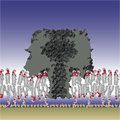
Biological Physics
Supramolecular Structures Lab
Lösche/Heinrich Group
Intermediate Optics
Carnegie Mellon University, Department of Physics
33.353 (12 units), Fall 2010
Instructors: Mathias Lösche (8-8367: Donna Thomas) and Barry Luokkala (8-2756)
Location and Time
Lectures:
W, F 11:30 a.m. to 12:20 p.m., DH A200; R 9:30 to 10:20 a.m., WeH 5304
Labs: T 9:00 to 11:50 a.m., DH A324
Prerequisites: 33-107 or 33-112 or 33-132
Course Overview
Optical instrumentation and optical devices are all around us and determine many aspects of our daily life. This course provides an introduction to the basic principles of optics, both in theoretical terms, covered in three weekly lectures, and in practical terms in a once-a-week laboratory exercise.
– What is light and how does it interact with matter?
– What are the basic properties that define electromagnetic waves and affect their propagation?
Most of these questions can be answered by confining our considerations to the wave aspects of light – and therefore quantum aspects will be considerably short-changed. Nevertheless, the primary goal of this course is that you become comfortable with the basic principles of geometrical and wave optics that lay the foundations for an enormous body of technology from optical instrumentation to modern-day cable communications. This should also prepare you to move on into advanced topics on your own and to apply your hands-on knowledge to real-world situations in academic or corporate R&D.
Goals
This course combines lectures with hands-on experience in exploring the fundamental properties of light: wavelength/energy; amplitude/intensity; and polarization. The interaction of light with matter is explored as refraction, scattering and diffraction. Interferometry as a high-precision measurement technique to determine minute differences in wavelength and/or position will be covered as well as the handling and characterization of optical fibers. Emphasis will be placed on good record keeping and clean evaluation of lab experiments, including error analysis. You will develop skills in observation and quantitative measurements and report your experimental results in written records similar to those in earlier laboratory courses you may have taken (although these are not a prerequisite).